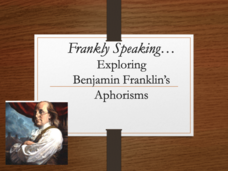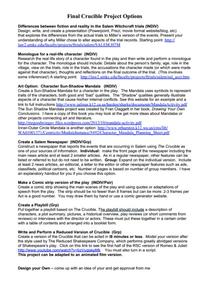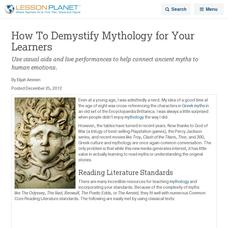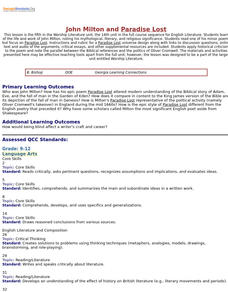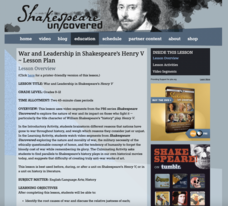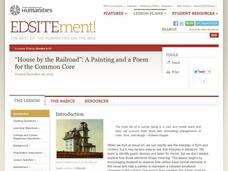Chandler Unified School District
Frankly Speaking: Exploring Benjamin Franklin's Aphorisms
Benjamin Franklin famously had an aphorism for every situation—most of which we still use in modern vernacular. Introduce class members to Franklin's Poor Richard's Almanack with a presentation that details the characteristics of aphorisms.
The New York Times
Teaching Orwell and '1984’ with the New York Times
Doublethink and alternate facts? Big Brother and Facebook? 1984 and 2019? Sales of 1984 have surged and so has the use of George Orwell's dystopian classic in classrooms. Whether new to teaching the novel or a seasoned veteran you'll...
Penguin Books
A Teacher’s Guide to the Signet Classics Edition of Mary Shelley ’s Frankenstein
Contrary to popular belief, the monster's name in Mary Shelley's Frankenstein is not Frankenstein. A teacher's guide for the novel helps readers make sense of key details in the text, define vocabulary words, and discuss prominent...
National Endowment for the Humanities
Faulkner's As I Lay Dying: Form of a Funeral
Learners read and analyze William Faulkner's novel, 'As I Lay Dying.' They define Faulkner's place in American literary history, describe Faulkner's "South" in the context of the historical South and examine the Bundren family through...
Curated OER
Dark Name-Play in Neil Gaiman's The Graveyard Book
Explore the symbolism of characters' names in The Graveyard Book by Neil Gaiman. This fantasy children's novel lends itself to symbolism and many parallels with other works of literature and time periods. Names of the ghosts and...
Curated OER
The Family: Louisiana Family Folklore
Students determine that all families create and pass on folklore. They research stories of their own names and draw parallels between their own and others' naming traditions. They infer characteristics of their communities' history...
Curated OER
What Is the True Story of the Three Little Pigs?
Cozy up and listen to a recording of The True Story of the Three Little Pigs and The Three Little Javelinas. Then, lead your class in a compare and contrast of the two stories by creating a Venn diagram.
National Endowment for the Humanities
Hamlet and the Elizabethan Revenge Ethic in Text and Film
Young scholars research the social context of Elizabethan England for Shakespeare's "Hamlet". They identify cultural influences on the play focusing on the theme of revenge and then analyze and compare film interpretations of the play.
Curated OER
Final Crucible Project Options
Finding and/or designing a menu of equally weighted synthesizing projects to end a unit can be a challenge. Simplify the task with this menu of individual and group projects meant to accompany a study of The Crucible. Presentations,...
Houghton Mifflin Harcourt
Walt Whitman: From Song of Myself
Looking for a resource that models how to read and analyze a poem? Check out this packet that uses sections of Walt Whitman's "Song of Myself" to demonstrate how to paraphrase, note literary elements, and identify the poet's inferences.
Curated OER
Living Thoreau As A Means Of Approaching Walden
Students investigate the essays and life of Thoreau in order to appreciate his point of view and understand his way of thinking. They participate in various activities and writing assignments to gain a similar perspective. Students write...
PBS
Frankenstein: The Consequence of Creation
Famous as a horror story, as the first science fiction novel, Frankenstein is also a tale of ambition, a warning about unbridled science, and responsibility for actions. Readers consider what the tale says of the consequences of creation...
Curated OER
Literature: The Russian Cinderella
Fifth graders compare and contrast the Russian fairytale, Wee Little Havroshechka" with the Anglo-Saxon "Cinderella." In groups the discuss and then write their own versions of the Cinderella story. Students write about the differences...
Curated OER
Defining American Culture Photographic Parallels
High schoolers assess the diversity of the photographs taken by a Czech photographer, that illustrate how existed in 1920's Texas. Then students compare and contrast these photographs with more current photographs of Texans and evaluate...
Curated OER
So You Think You Got A Problem
Students find alternatives to conflicts that they, may confront in their everyday lives Through the use of literature, students are given opportunities to use parallel tasks that will instruct them on how to identify and correct their...
Curated OER
Multi-sensory Writing
Students use their senses to help describe special place they have been. They write short sensory-image essay that incorporate all five of their senses, and identify sensory language while reading different pieces of literature.
Curated OER
Get Thee To Wife!
Students read and analyze a piece of literature from 1591 to investigate whether Elizabethan fathers were patriarchal dicatators. Students read the passage and answer questions to determine what fathers were like during the late...
Curated OER
Revolutions in Retrospect
Students analyze the social conditions of Victorian England and focus on the woman's place in Victorian society. In this Victorian England lesson, students read excerpts of Victorian writers and their take on the Industrial Revolution....
Curated OER
How To Demystify Mythology for Your Learners
Use visual aids and live performances to help connect ancient myths to human emotions.
Curated OER
John Milton and Paradise Lost
Students read one of his minor poems but focus on Paradise Lost. They apply historical criticism to the poem and note the parallel between the Biblical references and the politics of Oliver Cromwell.
Curated OER
"Standing Woman" by Yasutaka Tsutsui
Students explore the key concepts of the story, "Standing Woman" which portrays futuristic settings, and the search for artificial happiness. Parallels are drawn to Orwell's "Brave New World" and the movie, "Solent Green."
Curated OER
Year of the Impossible Goodbyes by Sook Nyul Choi
Students analyze Korean culture from their literature piece. They investigate the theme of oppression by an occupying army. Students encounter courage, resistance movements and explore the underground railroads.
Shakespeare Uncovered
War and Leadership in Shakespeare’s Henry V
“Compared to war all other forms of human endeavor shrink to insignificance.” “War is not healthy for children and other living things.” These two views of war, embodied in George Patton’s statement and Lorraine Schneider‘s famous 1966...
National Endowment for the Humanities
“House by the Railroad”: A Painting and a Poem for the Common Core
Introduce your class to ekphrastic poetry with an exercise that asks them to examine Edward Hooper's painting House by the Railroad and Edward Hirsch's poem "Edward Hopper and the House By the Railroad." After a close reading of the two...


